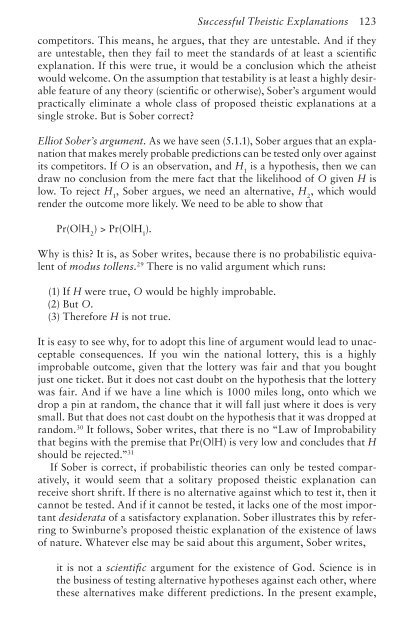Theism and Explanation - Appeared-to-Blogly
Theism and Explanation - Appeared-to-Blogly
Theism and Explanation - Appeared-to-Blogly
Create successful ePaper yourself
Turn your PDF publications into a flip-book with our unique Google optimized e-Paper software.
Successful Theistic <strong>Explanation</strong>s 123<br />
competi<strong>to</strong>rs. This means, he argues, that they are untestable. And if they<br />
are untestable, then they fail <strong>to</strong> meet the st<strong>and</strong>ards of at least a scientifi c<br />
explanation. If this were true, it would be a conclusion which the atheist<br />
would welcome. On the assumption that testability is at least a highly desirable<br />
feature of any theory (scientifi c or otherwise), Sober’s argument would<br />
practically eliminate a whole class of proposed theistic explanations at a<br />
single stroke. But is Sober correct?<br />
Elliot Sober’s argument. As we have seen (5.1.1), Sober argues that an explanation<br />
that makes merely probable predictions can be tested only over against<br />
its competi<strong>to</strong>rs. If O is an observation, <strong>and</strong> H 1 is a hypothesis, then we can<br />
draw no conclusion from the mere fact that the likelihood of O given H is<br />
low. To reject H 1 , Sober argues, we need an alternative, H 2 , which would<br />
render the outcome more likely. We need <strong>to</strong> be able <strong>to</strong> show that<br />
Pr(O|H 2 ) > Pr(O|H 1 ).<br />
Why is this? It is, as Sober writes, because there is no probabilistic equivalent<br />
of modus <strong>to</strong>llens. 29 There is no valid argument which runs:<br />
(1) If H were true, O would be highly improbable.<br />
(2) But O.<br />
(3) Therefore H is not true.<br />
It is easy <strong>to</strong> see why, for <strong>to</strong> adopt this line of argument would lead <strong>to</strong> unacceptable<br />
consequences. If you win the national lottery, this is a highly<br />
improbable outcome, given that the lottery was fair <strong>and</strong> that you bought<br />
just one ticket. But it does not cast doubt on the hypothesis that the lottery<br />
was fair. And if we have a line which is 1000 miles long, on<strong>to</strong> which we<br />
drop a pin at r<strong>and</strong>om, the chance that it will fall just where it does is very<br />
small. But that does not cast doubt on the hypothesis that it was dropped at<br />
r<strong>and</strong>om. 30 It follows, Sober writes, that there is no “Law of Improbability<br />
that begins with the premise that Pr(O|H) is very low <strong>and</strong> concludes that H<br />
should be rejected.” 31<br />
If Sober is correct, if probabilistic theories can only be tested comparatively,<br />
it would seem that a solitary proposed theistic explanation can<br />
receive short shrift. If there is no alternative against which <strong>to</strong> test it, then it<br />
cannot be tested. And if it cannot be tested, it lacks one of the most important<br />
desiderata of a satisfac<strong>to</strong>ry explanation. Sober illustrates this by referring<br />
<strong>to</strong> Swinburne’s proposed theistic explanation of the existence of laws<br />
of nature. Whatever else may be said about this argument, Sober writes,<br />
it is not a scientifi c argument for the existence of God. Science is in<br />
the business of testing alternative hypotheses against each other, where<br />
these alternatives make different predictions. In the present example,



